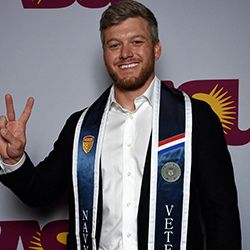
Veterans Day Profile: Mark Cancemi

Veterans Day honors those who have served in the United States military. In recognition of their commitment and sacrifice, the University of Arizona College of Medicine – Phoenix will share a few stories of medical students who have served or are currently serving in the U.S. military.
Meet Mark Cancemi
Born and raised in Dallas, Texas, Mark Cancemi was introduced to medicine at an early age. With his father being an anesthesiologist and his mother working as a nurse at an advanced heart failure clinic, it seemed he was destined to aspire for a career in the health professions.
After finishing high school in 2010, Cancemi moved to Norman, Oklahoma for his undergraduate studies at the University of Oklahoma. However, due to poor academic performance — lacking focus in his studies — Cancemi decided to withdraw and enlist in the U.S. military. From there, a new path was formed.
“When I began planning my life after the Navy, I realized that the character development I’d experienced and the benefits I’d earned had now made medicine a realistic career,” Cancemi said.

Serving in the U.S. Navy for eight years, Cancemi worked as a nuclear machinist’s mate, operating and maintaining the nuclear reactors that powered the USS Carl Vinson. Cancemi recognizes his initial lack of success in college was a result of being undisciplined.
“Joining the Navy seemed like a good way to develop direction and discipline while serving and doing something that mattered,” Cancemi said. “Also, I figured my parents wouldn’t be as mad at me for failing out of college if I said I was joining the military.”
His time in the military made his transition to medical school feasible. Before being discharged, Cancemi began taking classes online at Arizona State University (ASU) to finish his degree. After leaving the Navy, Cancemi moved from South Carolina to Scottsdale, Arizona, to complete his studies at ASU on campus.
Cancemi’s service in the Navy taught him how to handle responsibility as the reactor is the most critical piece of equipment on the aircraft carrier.
“There are high standards and a small margin for error when working in the nuclear plant and engine room,” Cancemi said. “Handling this responsibility required me to manage my time effectively, adapt in dynamic situations, work with others, take criticism and learn from my mistakes.”
In the military, Cancemi was a part of a diverse workforce and was exposed to many viewpoints, ideas and personalities that he had not experienced during his upbringing. Gaining this exposure while working in a career with such a strong foundation of cooperation and dedication to others allowed him to experience a massive level of personal growth.
“I’m extremely grateful to have the opportunity to work in medicine as it affords this same opportunity for growth through service,” Cancemi said.
Cancemi said that transitioning out of the military is a huge undertaking and can be a challenging period for veterans, regardless of what field a person plans to go into. He urged that anyone who needs support during this process to seek out mental health resources if they're struggling and to talk to other veterans if they need guidance.
“If you decide medicine is right for you, make sure you understand the educational benefits you’ll be using and take advantage of all the programs and services out there for student veterans,” Cancemi said. “Programs like Service2school will give you a pre-med advisor who is a student veteran in medical school.”
About the College
Founded in 2007, the University of Arizona College of Medicine – Phoenix inspires and trains exemplary physicians, scientists and leaders to advance its core missions in education, research, clinical care and service to communities across Arizona. The college’s strength lies in our collaborations and partnerships with clinical affiliates, community organizations and industry sponsors. With our primary affiliate, Banner Health, we are recognized as the premier academic medical center in Phoenix. As an anchor institution of the Phoenix Bioscience Core, the college is home to signature research programs in neurosciences, cardiopulmonary diseases, immunology, informatics and metabolism. These focus areas uniquely position us to drive biomedical research and bolster economic development in the region.
As an urban institution with strong roots in rural and tribal health, the college has graduated more than 1,000 physicians and matriculates 130 students each year. Greater than 60% of matriculating students are from Arizona and many continue training at our GME sponsored residency programs, ultimately pursuing local academic and community-based opportunities. While our traditional four-year program continues to thrive, we will launch our recently approved accelerated three-year medical student curriculum with exclusive focus on primary care. This program is designed to further enhance workforce retention needs across Arizona.
The college has embarked on our strategic plan for 2025 to 2030. Learn more.